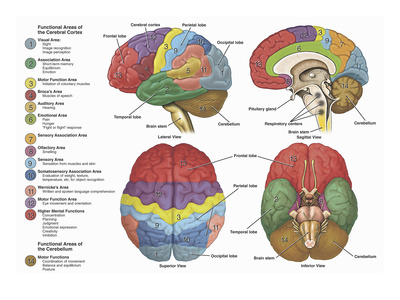From a study by Foss, AH, Altschuler, EL, and James, KH:
Millennia ago Pythagoras noted a simple but remarkably powerful rule for the aesthetics of tone combinations: pairs of tones–intervals–with simple ratios such as an octave (ratio 2 : 1) or a fifth (ratio 3 : 2) were pleasant sounding (consonant), whereas intervals with complex ratios such as the major seventh (ratio 243 : 128) were harsh (dissonant). These Pythagorean ratio rules are the building blocks of Western classical music; however, their neurophysiologic basis is not known. Using functional MRI we have found the neurophysiologic correlates of the ratio rules. In musicians, the inferior frontal gyrus, superior temporal gyrus, medial frontal gyrus, inferior parietal lobule and anterior cingulate respond with progressively more activation to perfect consonances, imperfect consonances and dissonances. In nonmusicians only the right inferior frontal gyrus follows this pattern.
One thing that’s interesting about this study is that there is so much more involvement in the brain upon hearing tones among musicians. Here the study has identified five areas that respond to tones in musicians, and only one in non-musicians. In addition, the abstract seems to indicate that both hemispheres of the brain are involved in musicians, versus only the right brain in non-musicians.

Brain from Four Different Views Using Color-Coding to Show the Anatomy and Functional Area
Nucleus Medical Art
And what do all these parts of the brain do? Well, no-one knows yet, exactly. However, I’ve begun to outline our best guesses on the Neuroanatomy page. What does make sense is that these parts of the brain are all involved in daily living, and so the more active and exercised they are, the better they serve us (just as exercise makes our bodies healthier, it makes our brains healthier, too), and so it seems that music lessons make our lives better in ways that we are only beginning to understand.
Another, more philosophically interesting thing, is that the universal laws seem to hold true for our brains as well. We are in our existing universe, where strings vibrate consonantly at certain ratios, and our brains have built-in understandings of these ratios, and the capacity for understanding these ratios increases with musical training, because much more of the brain becomes involved–so it follows that there might be an understanding at a deeper, more rich level because of musical training. Someone once said to me that he didn’t want any theoretical knowledge of music because it would destroy his enjoyment of it. I asked, “Who gets more enjoyment out of a baseball game? Someone who doesn’t know anything about it, or someone who understands not only the rules, but can appreciate the subtleties and strategies of each player?” Why should it be any different for music? And now the research seems to side with my point of view.